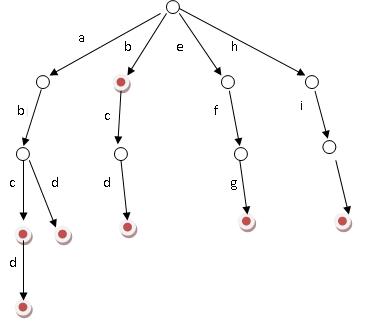Trie樹就是字典樹,其核心思想就是空間換時間。
舉個簡單的例子。
給你100000個長度不超過10的單詞。對于每一個單詞,我們要判斷他出沒出現(xiàn)過,如果出現(xiàn)了,第一次出現(xiàn)第幾個位置。
這題當然可以用hash來,但是我要介紹的是trie樹。在某些方面它的用途更大。比如說對于某一個單詞,我要詢問它的前綴是否出現(xiàn)過。這樣hash就不好搞了,而用trie還是很簡單。
現(xiàn)在回到例子中,如果我們用最傻的方法,對于每一個單詞,我們都要去查找它前面的單詞中是否有它。那么這個算法的復雜度就是O(n^2)。顯然對于100000的范圍難以接受。現(xiàn)在我們換個思路想。假設(shè)我要查詢的單詞是abcd,那么在他前面的單詞中,以b,c,d,f之類開頭的我顯然不必考慮。而只要找以a開頭的中是否存在abcd就可以了。同樣的,在以a開頭中的單詞中,我們只要考慮以b作為第二個字母的……這樣一個樹的模型就漸漸清晰了……
假設(shè)有b,abc,abd,bcd,abcd,efg,hii這6個單詞,我們構(gòu)建的樹就是這樣的。
對于每一個節(jié)點,從根遍歷到他的過程就是一個單詞,如果這個節(jié)點被標記為紅色,就表示這個單詞存在,否則不存在。
那么,對于一個單詞,我只要順著他從跟走到對應(yīng)的節(jié)點,再看這個節(jié)點是否被標記為紅色就可以知道它是否出現(xiàn)過了。把這個節(jié)點標記為紅色,就相當于插入了這個單詞。
這樣一來我們詢問和插入可以一起完成,所用時間僅僅為單詞長度,在這一個樣例,便是10。
我們可以看到,trie樹每一層的節(jié)點數(shù)是26^i級別的。所以為了節(jié)省空間。我們用動態(tài)鏈表,或者用數(shù)組來模擬動態(tài)。空間的花費,不會超過單詞數(shù)×單詞長度。
給出一個用類封裝的字典樹代碼,厄。。。做ACM的模板用另一個。。應(yīng)該放在了“ACM模板”文件夾下了。。。
 #include <cstdio>
#include <cstdio> #include <iostream>
#include <iostream> #include <cstring>
#include <cstring> using namespace std;
using namespace std;

 const int num_chars = 26;
const int num_chars = 26;


 class Trie
class Trie  {
{ public:
public:
 Trie():root(NULL)
Trie():root(NULL) {};
{}; Trie(Trie& tr);
Trie(Trie& tr);
 int search(const char* word, char* entry ) const;
int search(const char* word, char* entry ) const; int insert(const char* word, const char* entry);
int insert(const char* word, const char* entry); int remove(const char* word, char* entry);
int remove(const char* word, char* entry); private:
private: struct Trie_node
struct Trie_node

 {
{ char* data;
char* data; Trie_node* branch[num_chars];
Trie_node* branch[num_chars]; Trie_node();
Trie_node(); }* root;
}* root; };
}; Trie::Trie_node::Trie_node()
Trie::Trie_node::Trie_node() 

 {
{ data = NULL;
data = NULL; for (int i=0; i<num_chars; ++i)
for (int i=0; i<num_chars; ++i)  branch[i] = NULL;
branch[i] = NULL; }
}
 int Trie::search(const char* word, char* entry ) const
int Trie::search(const char* word, char* entry ) const 

 {
{ int position = 0;
int position = 0; char char_code;
char char_code; Trie_node *location = root;
Trie_node *location = root; while( location!=NULL && *word!=0 )
while( location!=NULL && *word!=0 ) 

 {
{ if (*word>='A' && *word<='Z')
if (*word>='A' && *word<='Z')  char_code = *word-'A';
char_code = *word-'A'; else if (*word>='a' && *word<='z')
else if (*word>='a' && *word<='z')  char_code = *word-'a';
char_code = *word-'a'; else return 0;
else return 0;

 location = location->branch[char_code];
location = location->branch[char_code]; position++;
position++; word++;
word++; }
} if ( location != NULL && location->data != NULL )
if ( location != NULL && location->data != NULL ) 

 {
{ strcpy(entry,location->data);
strcpy(entry,location->data); return 1;
return 1; }
} else return 0;
else return 0; }
} int Trie::insert(const char* word, const char* entry)
int Trie::insert(const char* word, const char* entry) 

 {
{ int result = 1, position = 0;
int result = 1, position = 0; if ( root == NULL ) root = new Trie_node;
if ( root == NULL ) root = new Trie_node; char char_code;
char char_code; Trie_node *location = root;
Trie_node *location = root; while( location!=NULL && *word!=0 )
while( location!=NULL && *word!=0 )

 {
{ if (*word>='A' && *word<='Z')
if (*word>='A' && *word<='Z')  char_code = *word-'A';
char_code = *word-'A'; else if (*word>='a' && *word<='z')
else if (*word>='a' && *word<='z')  char_code = *word-'a';
char_code = *word-'a'; else return 0;
else return 0;

 if( location->branch[char_code] == NULL )
if( location->branch[char_code] == NULL )  location->branch[char_code] = new Trie_node;
location->branch[char_code] = new Trie_node;

 location = location->branch[char_code];
location = location->branch[char_code]; position++;
position++; word++;
word++; }
} if (location->data != NULL)
if (location->data != NULL) result = 0;
result = 0;
 else
else  {
{ location->data = new char[strlen(entry)+1];
location->data = new char[strlen(entry)+1]; strcpy(location->data, entry);
strcpy(location->data, entry); }
} return result;
return result; }
} int main()
int main()

 {
{ Trie t;
Trie t; char entry[100];
char entry[100]; t.insert("aa", "DET");
t.insert("aa", "DET");  t.insert("abacus","NOUN");
t.insert("abacus","NOUN"); t.insert("abalone","NOUN");
t.insert("abalone","NOUN");  t.insert("abandon","VERB");
t.insert("abandon","VERB"); t.insert("abandoned","ADJ");
t.insert("abandoned","ADJ");  t.insert("abashed","ADJ");
t.insert("abashed","ADJ"); t.insert("abate","VERB");
t.insert("abate","VERB");  t.insert("this", "PRON");
t.insert("this", "PRON"); if (t.search("this", entry))
if (t.search("this", entry)) cout<<"'this' was found. pos: "<<entry<<endl;
cout<<"'this' was found. pos: "<<entry<<endl; if (t.search("abate", entry))
if (t.search("abate", entry)) cout<<"'abate' is found. pos: "<<entry<<endl;
cout<<"'abate' is found. pos: "<<entry<<endl; if (t.search("baby", entry))
if (t.search("baby", entry)) cout<<"'baby' is found. pos: "<<entry<<endl;
cout<<"'baby' is found. pos: "<<entry<<endl; else
else cout<<"'baby' does not exist at all!"<<endl;
cout<<"'baby' does not exist at all!"<<endl;
 if (t.search("aa", entry))
if (t.search("aa", entry)) cout<<"'aa was found. pos: "<<entry<<endl;
cout<<"'aa was found. pos: "<<entry<<endl; }
}

PS:實現(xiàn)方法http://met.fzu.edu.cn/eduonline/web/web/resources/articleContent.asp?id=346


